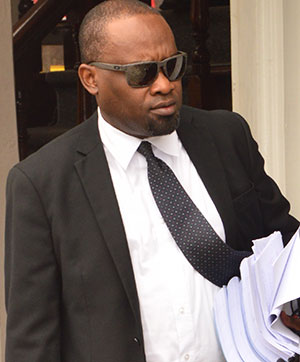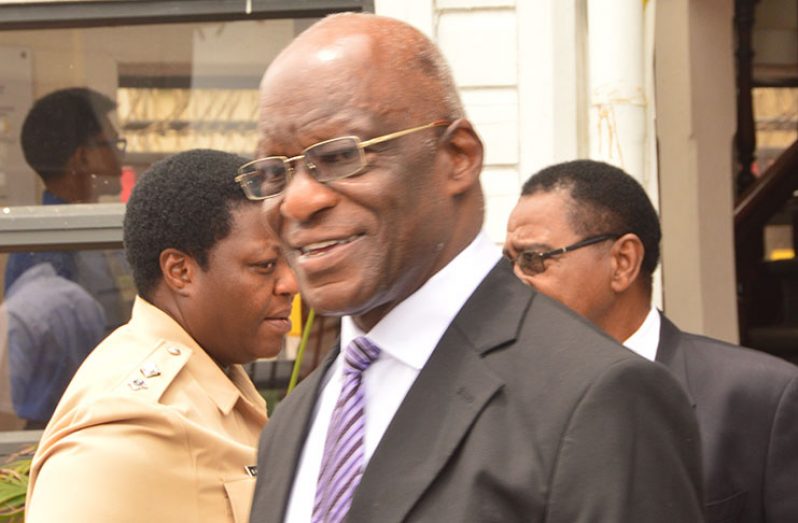…Grenadian QC says CJ did not analyse stages required to arrive at majority
Queen’s Counsel and former Attorney General of Grenada, Dr. Francis Alexis on Tuesday argued that 34 votes in the 65-member National Assembly constitute an absolute majority and not 33 as ruled by Chief Justice Roxane George-Wiltshire when she upheld that the No-Confidence Motion was validly passed by a majority in the National Assembly.
Dr. Alexis, who hails from Grenada and on Monday joined the government’s legal team appeared before Chancellor of the Judiciary Yonette Cummings-Edwards and Justices of Appeal Dawn Gregory and Rishi Persaud, on behalf of Attorney General Basil Williams, when oral arguments commenced in the two constitutional cases – Attorney General v Christopher Ram and others; and the Attorney General v The Speaker of National Assembly and others.

In his opening argument, Dr. Alexis told the Appellate Court that the Chief Justice was led into error when she ruled that 33 votes satisfied the requirement outlined in the Constitution for the passage of a No-Confidence Motion. He said in the case of an “ordinary act” a simple majority is required, however, in the case of a No-Confidence Motion, a higher requirement is set, and as such, there is need for an absolute majority in accordance with Article 106 (6).
Before turning the Court’s attention to the formula which would give rise to a 34 majority, Dr. Alexis explained that whenever the Court is interpreting provisions on No-Confidence Motion, the court uses literal interpretation but said the purposive approach will help in arriving at the objectives of the framers of the Constitution.
He said the “tradition and usages” which were known to the framers must be considered, emphasising that the framers were not operating in a vacuum. “The nature of a Constitution requires that a broad, generous and purposive approach be adopted to ensure that its interpretation reflects the deeper inspiration and aspiration of the basic concepts on which the Constitution is founded.
Respect must be paid to the language that is used and its context, by considering all relevant provisions bearing on the subject for interpretation as a whole, and to the traditions and usages which have given meaning to that language, in order to effect the objective of the Constitution. In order to do this the court must have a sober and objective appraisal of the general canvas upon which the details of the constitutional picture are painted,” Dr. Alexis said as he quoted Sir Denis Byron in the case the Attorney General of Grenada v The Grenada Bar Association.
On that note, he asked the Court to consider what “majority of all the elected members of the National Assembly” meant at the time the framers crafted the Constitution.
The Queen Counsel put to the Appellate Court that the Chief Justice should have utilised a two-phase methodology to arrive at an absolute majority. According to him, phase one entails dividing the number of members, in this case 65, by two, which would result in a stage one outcome. He said once the outcome is a fraction it must be rounded up and then one is added to the number to arrive at the absolute majority.
“It is always rounded up not down,” Dr. Alexis emphasised.
It was noted that while the principle has not yet been demonstrated in any case binding on the Courts of Guyana, it however, has been applied in cases which the Courts of Guyana may properly consider to be of persuasive authority. These cases include Hughes v Rogers, Kilman v Speaker of the Parliament of the Republic of Vanuatu, H M Rajapappa v Director of Agricultural Marketing and Agricultural Procuder Marketing Committee, Ganesh Sukhdeo Gurule v Tahsildar Sinnar & Ors-Civil Appeal, Biraj Misti v District Panchayat Raj Officer 1998 and Fakrun Nessa Choudhury v The State of Assam.
The Queen’s Counsel argued that the learned Chief Justice was led into error when she proceeded on the basis that article 106(6) did not involve a fraction. Attorney-at-Law Roysdale Forde, who is representing Representative of the A Partnership for National Unity (APNU) Joseph Harmon, told the Appellate Court that the Chief Justice in the case Attorney General v The Speaker of the National Assembly and others, made five major errors which affected the decision of the court.
Forde contended that the first major error resulted when the Chief Justice failed to recognize that there was a material difference between vote of a majority and a majority of votes. He submitted that Article 106 (6) which sets the foundation for a vote of confidence, is the only provision in the Constitution in which vote of a majority is employed.
Secondly, the attorney put to the court that the Chief Justice erred again when she concluded that half plus one is equal to one above all rivals combined and they were essentially the same. “So the first error I pointed out your honour is that the court did not draw a distinction between votes of a majority and a majority of votes; and the second is that the learnt Chief Justice stated in her decision that the half plus one rule is equal to one over all rivals combined and essentially the same exited in each case,” he summarised.
Forde said that the Chief Justice arrived at that conclusion because she relied on the Kilman’s case which presented an even number member House; however, consideration must be given to uneven number member houses. Forde also drew the court’s attention to the difference between a vote of confidence and a vote of no-confidence.




.jpg)









